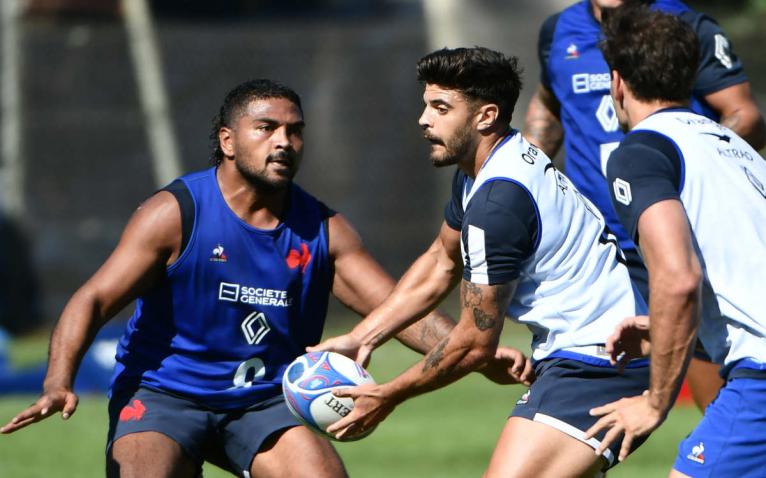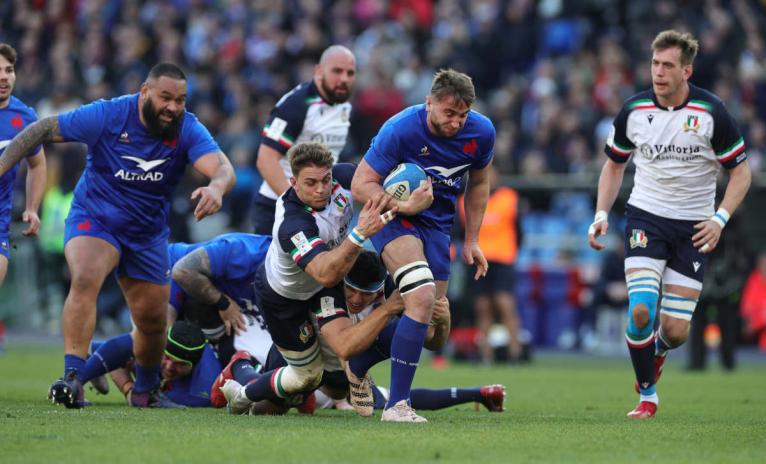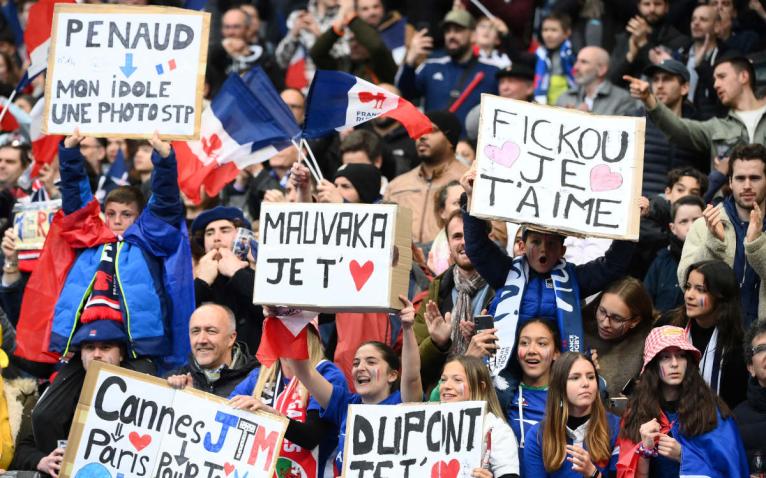Fabien Galthié whittled down his World Cup squad from 42 players to 33 on Monday and it was done with more than a dash of French flair.
On the primetime lunchtime news bulletin the names of the squad were read out not by Galthié but by ordinary men and women from across France: bistro owners in provincial France, farmers in rural France, market traders in Paris, students in Marseille and beach rugby players on the Cote d’Azur. At the end of the announcement there flashed up on screen France’s World Cup slogan: ‘United for a Dream’.
And the French are dreaming. Three times they have reached the final – 1987, 1999 and 2011 – and three times they have lost. They believe that this is their year: the players, the pundits, the press and the public.
Never before in World Cup history have France had such a settled squad, in contrast to their bitter rivals across the water. Once it was England who approached World Cups oozing confidence with the combinations bedded down for at least a couple of seasons. The French, on the other hand, were often riven by tensions, denying rumours in the media of dissension between the players and the coaching staff.
But the 33 players selected by Galthié were, by and large, as expected. The one notable absence is Toulouse fly-half Romain Ntamack, who ruptured his knee ligaments in last weekend’s win over Scotland. Prop Cyrill Baille, who picked up a calf injury in the same game, is included in the final list but Galthié has admitted he’s unlikely to be fit before the final poo match against Italy on October 6.

The talking points are unlikely to have tongues wagging too long in the bars and bistros across France. At full-back Melvyn Jaminet was chosen as understudy to Thomas Ramos, meaning the veteran Brice Dulin is one of the nine reservists.
Scrum-half Baptiste Serin, once hailed as the successor to Morgan Parra, was nudged out of contention by Baptiste Couilloud, who joins Antoine Dupont and Maxime Lucu as one of three 9s in the squad.
Of the four uncapped players selected by Galthié in his initial 42-man squad, two have been named in the final group: Bordeaux winger Louis Bielle-Biarrey and La Rochelle flanker Paul Boudehent, both of whom won their first caps in the 25-21 defeat to Scotland earlier this month.
The 24-year-old Boudehent was a member of the La Rochelle XV that beat Leinster to win last season’s Champions Cup, and France forwards’ coach Karim Ghezal described him recently as “very powerful and a very good ball carrier…a real athlete”.
Bielle-Biarrey is more than two stones lighter than Dumortier but he a touch of the Cheslin Kolbe about him; beautifully balanced, lightning quick and a winger, who can also play 15
Another member of the French coaching staff, William Servat, has likened Boudehent to Anthony Jelonch, and that may be one of the reasons he got the nod in Galthié’s final squad. Jelonch is also in, but the Toulouse flanker hasn’t played any competitive rugby since he ruptured knee ligaments in last season’s Six Nations win over Scotland. Galthié has gambled on Jelonch recovering his fitness and form in time for the World Cup, but if he doesn’t make it then Boudehent is a like for like replacement.
The 20-year-old Bielle-Biarrey is the babe of the squad and is in at the expense of Ethan Dumortier, who impressed in his debut Six Nations at the start of this year, but whose form has since fallen away. Only 12st 4lbs, Bielle-Biarrey is more than two stones lighter than Dumortier but he a touch of the Cheslin Kolbe about him; beautifully balanced, lightning quick and a winger (who can also play 15) who has an instinctive feel for the right angles to run. As Galthie said in justifying his selection, Bielle-Biarrey has the ‘wow’ factor.

Bielle-Biarrey’s great mate, Émilien Gailleton, didn’t make the final squad, missing out to Arthur Vincent. The Montpellier centre was playing for his place against Fiji last Saturday, and he rose to the challenge. He may lack the cutting edge in attack of the 20-year-old Gailleton but such was the strength of Vincent’s defence that he blunted the Pacific Islanders’ offensive ambition.
The 34-17 victory over Fiji was evidence of the strength in depth of France. Fielding a largely second-string XV (among the backline only Jonathan Danty at 12 is likely to start France’s RWC opener against the All Blacks on Friday 8 September), the Bleus scored three tries and restricted their opponents to just two through a well-organised and well-executed defensive effort.
Galthié described himself as “satisfied” post-match, not just with the win over Fiji, but also the improvement in each performance over the course of their three warm-up matches. “These are preparatory matches and we’re trying to raise the bar in relation to what we do during the week,” he explained.
You play focused on your qualities, and only your qualities. Not what you lack. Go with what you’ve got, your strengths, and those strengths are why you’re wearing the France jersey. So stay focused on that.
Fabien Galthie
So can this France squad go all the way? Yes. They have the talent, significantly in the key positions – Julien Marchand at hooker, Grégory Alldritt at No 8, Antoine Dupont and Matthieu Jalibert at half-back and Thomas Ramos at full-back – and they have top-class cover in all positions, except in the second-row. They also have great versatility; Flanker Sekou Macalou – who scored an intercept try against Fiji – has also been capped on the wing; hooker Peato Mauvaka finished the Fiji game at No8, Ramos is comfortable wearing 15 or 10; Thibaud Flament and Cameron Woki can play at lock or on the flank, and most of the French centres and wings are interchangeable.
They have a coaching staff that has been in place for several seasons and share the same clear vision of what they are trying to achieve on the pitch. This is encompassed within a philosophy described by Galthié last year as: “You play focused on your qualities, and only your qualities. Not what you lack. Go with what you’ve got, your strengths, and those strengths are why you’re wearing the France jersey. So stay focused on that.”

Above all, they have the goodwill of the nation. It hasn’t been the best of years for France. There have been protests, riots and strikes, not to mention a cost of living of crisis and a series of sporting administration scandals, all of which have dampened the collective spirit of the Republic.
They believe that rugby will be their renaissance and their faith in their ‘rugbymen’ is growing. The atmosphere at the two home matches this month – against Scotland and Fiji – caught even the players by surprise. “When you see the excitement in Saint-Étienne and Nantes, you wonder what it’s going to be like against New Zealand on 8 September,” said scrum-half Maxime Lucu. “Now we want to get down to business.”
French rugby is definitely united. Now it’s down to Galthie and his players to make the dream come true.
Once the 33 names of Galthié World Cup squad had been announced on TV, the coach explained why he had chosen this novel method of unveiling his players. “When we began our mandate [after the 2019 RWC], we wanted to give meaning to what we were going to do,” he told the presenter. “French rugby was going through a rather complicated period. The watchword was to unite.”
There was a feeling that the national team no longer engaged with its core supporters: the amateur clubs, the schools and the legion of volunteers who give up their time each week to coach, administrate and organise. “We all come from clubs, colleges and universities,” continued Galthié. “We’ve always been lucky enough to have volunteers who have looked after us. This was an opportunity to shine a light on these people and give them a voice.”
French rugby is definitely united. Now it’s down to Galthie and his players to make the dream come true.



Comments
Join free and tell us what you really think!
Sign up for free